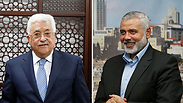
Palestinian President Mahmoud Abbas (L) and Hamas politburo chief Ismail Haniyeh

The Egyptian maestro and his Palestinian marionettes
Analysis: Hamas may have given up the Gaza administrative committee, but it will keep running the strip. The announcement, which was used as bait to bring the PA delegation to Cairo, will allow Abbas to lift the sanctions and renew the economic aid to Gaza. This is an Israeli interest too.
The most fascinating part of Hamas’ “strategic turnabout” is the marionette theater: The elegant ease with which the director of the Egyptian General Intelligence Directorate, General Khaled Fawzy, is leading the Palestinian wooden puppets. With his right hand, he’s entertaining himself with Hamas’ political bureau, and with his left hand, he’s pulling the strings of the Palestinian Authority delegation.

The general is not alone. The entire department in the Egyptian General Intelligence Directorate dealing with the mater is fussing over the Palestinian marionettes, isolating them from other centers of power in the Arab world, making sure they don’t disrupt Maestro Fawzy’s efforts to run the marionette theater as he sees fit.
The Middle East was very excited last week after the maestro concocted the announcement made by Hamas politburo chief Ismail Haniyeh on the dissolution of the “administrative committee,” which was established by Hamas for the civil management of the Gaza Strip. Allegedly, this is an unusual Hamas concession, as the committee was a knife in the back of Mahmoud Abbas, who is formally in charge of the strip’s civil affairs through the joint “national agreement government.”

Abbas and Haniyeh. This is exactly what the reconciliation talks between Hamas and the PA in 2011 and 2014 looked like (Photo: Reuters, AFP)
The media went wild with its headlines. Hamas was presented as caving in and calling for an intra-Palestinian reconciliation before Abbas had even lifted a single sanction imposed on the strip. At the same time, the Egyptians instructed Abbas to send a delegation to Cairo to launch negotiations to renew the reconciliation process between Hamas and the Palestinian Authority.
But although Hamas conceded the administrative committee, it will keep running the strip. Giving up the shadow government was just bait used by Fawzy to bring the PA delegation to Cairo. I doubt Hamas itself takes its announcement seriously.
In light of Hamas’ gesture, Abbas couldn’t say no to the Egyptians and was forced to send a delegation to Cairo to look into the possibility of relaunching reconciliation talks. Now, in a bid to intensify the drama and make the move seem more serious, everyone is waiting for the senior Hamas representative from Lebanon, Saleh al-Arouri, and for Hamas’ new foreign minister, Moussa Abu Marzouk, to come to Cairo and participate in the talks.
It’s a real déjà vu. This is exactly what the reconciliation talks between Hamas and the PA in 2011 and 2014 looked like. Statements were made and gloriously-worded agreements were written. Then, like today, Hamas wasn’t interested in a reconciliation under the PA’s conditions, and vice versa. Its goal is practical: To renew the economic aid from the PA.
Meanwhile, the Egyptian aid to the strip is faltering too. Contrary to previous commitments, Egypt isn’t opening the Rafah Crossing because it doesn’t believe Hamas will cut its ties with the Islamic State in Sinai. ISIS in Sinai appears to have more foreigners today, including Palestinians from the strip. The Egyptians not only want Hamas to close the tunnels to Sinai completely, they are also demanding real cooperation in turning in ISIS fighters from the strip. The Egyptians open and close the fuel pipe according to their own interests. Last week, 16 Egyptian policemen were murdered in Sinai and the fuel supply was stopped for three days. In this state of affairs, the fuel from Israel—which is funded by the PA—is Gaza’s oxygen.
The concessions made by Hamas following the Egyptian pressure will allow Abbas to get off his high horse, lift the sanctions and start funneling money to the strip again. Israel, on its part, should encourage the reconciliation process. If the economic situation in Gaza improves following this process, it will moderate the estimates of a possible military conflict.
Meanwhile, General Fawzy will likely orchestrate reports on the deployment of PA forces in the Gaza crossings, as well as reports on the establishment of joint Hamas-PA committees. But the PA delegation has yet to meet the Hamas delegation, there is no agreement on parliamentary and presidential elections—as required by Hamas—and, most importantly, Abbas is not keen on the possibility that Mohammad Dahlan will become a key player in Gaza with Egypt's support.















